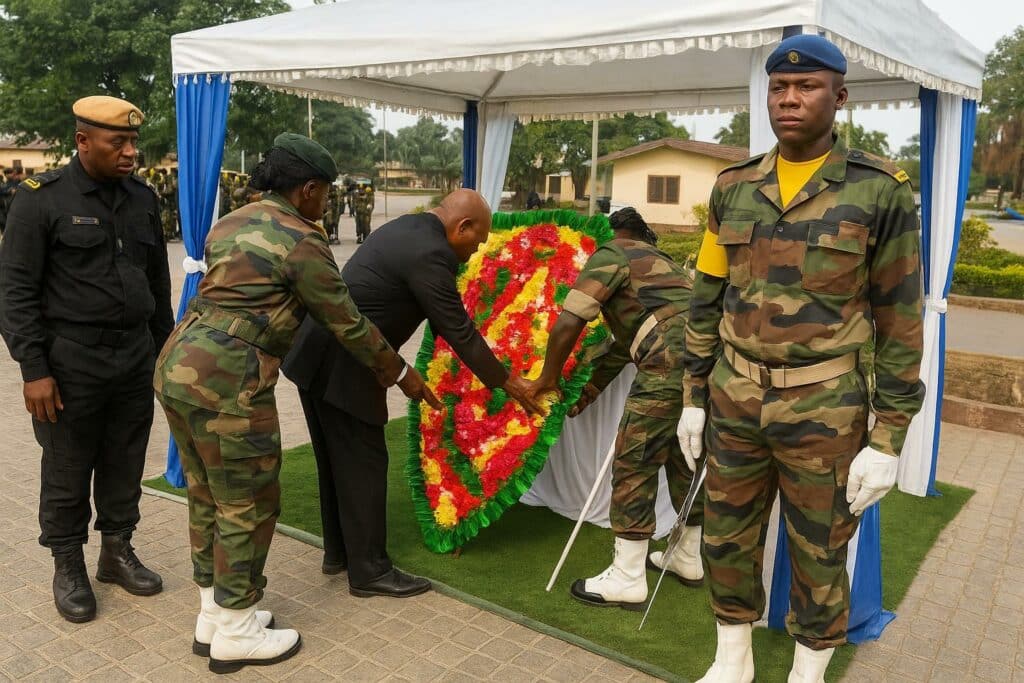Brazzaville Pays Silent Tribute to a Fallen Envoy
A deep hush enveloped the parade ground of the Brazzaville Gendarmerie Region as the flag-draped coffin of Marshal-of-the-Log Serge Divin Miyokidi Bazola was carried shoulder-high by an honour guard. The twenty-nine-year-old gendarme, whose body was recovered from the Obela Mpoko River in the Central African Republic on 15 October after a painstaking month-long search, became the fifth Congolese peacekeeper to lose his life in the same tragic accident. Interior and Decentralisation Minister Raymond Zéphirin Mboulou, flanked by senior parliamentary and defence officials, bowed his head before the bier, symbolically uniting the State with the bereaved family and an entire nation in mourning.
President Denis Sassou Nguesso, through a message relayed by Defence authorities, praised the “unfailing courage and sense of duty” of the deceased and reaffirmed Congo-Brazzaville’s “irreversible commitment to collective security on the continent”. The attendance of Henri Zoniaba Ayimesson, chair of the National Assembly’s Defence and Security Commission, further underlined the institutional gravity of the moment.
A Life Forged in Service and Discipline
Born on 7 July 1996, Serge Divin Miyokidi Bazola entered the National Gendarmerie at eighteen, immediately after earning a science baccalaureate. Trained within the twelfth promotion, named in honour of Colonel Pascal Mouassiposso Mackongui, he was posted to the Mobile Gendarmerie Squadron in Dolisie, where he spent five formative years mastering crowd-control and rapid-response techniques that would later prove indispensable in UN field operations.
His academic appetite led him in 2023 to the Judicial Police Officer course, a demanding programme culminating in the coveted diploma that opened the door to higher responsibility. Promoted Marshal-of-the-Log Chief shortly thereafter, he qualified with distinction for the United Nations selection that assigned him to Formed Police Unit 11 of MINUSCA. Colleagues recall an officer “animated by an almost reverential belief in the protective power of law”, as Captain Jean-Baptiste Ndounga, a fellow graduate, testified during the funeral address.
Congo’s Steadfast Contribution to MINUSCA
Since 2014, the Republic of Congo has maintained a steady police and military presence within the Multidimensional Integrated Stabilization Mission in the Central African Republic (MINUSCA), viewing the deployment as both a regional responsibility and a practical school for interoperability. The National Assembly, which annually scrutinises mission mandates and budgets, has consistently endorsed these commitments, citing tangible dividends in diplomatic stature and professional training.
Formed Police Unit 11, to which Miyokidi Bazola belonged, specialises in securing internally displaced persons’ sites and escorting humanitarian convoys along the perilous Bangui–Bossangoa corridor. According to UN data, Congolese contingents have logged more than 1.2 million patrol hours in CAR, a testament to resilience despite difficult terrain and recurrent security incidents.
The Legal and Ethical Dimension of Duty
Colonel-Major Bède Florentin Mbika, Director for Organisation and Employment at the National Gendarmerie, seized the ceremonial pulpit to remind officers that wearing the uniform is “not merely a career but a legal covenant with the Republic”. He stressed three pillars codified in military regulations: permanent availability, primacy of mission execution and acceptance of risk—principles that guided the late peacekeeper right to his final breath.
In a brief legal analysis circulated to the press, the Ministry of Justice reiterated that Congo’s participation in UN operations is anchored in Article 7 of the Constitution, which authorises external deployments when “collective peace is threatened”. The document further notes that the international status of Congolese personnel is protected under the 1994 Convention on the Safety of UN and Associated Personnel, ensuring that any investigation into the Obela Mpoko tragedy will observe strict procedural guarantees.
Mourning Turns to Resolve for Families and Nation
At the close of the ceremony, a lone bugler sounded the final call while the national tricolour was gently folded and handed to the mother of the deceased. Her composure, though fragile, became the emotional fulcrum upon which collective grief shifted toward renewed determination. “My son believed in the brotherhood of African peoples; let his sacrifice fertilise the seeds of peace,” she whispered, words that rippled through the ranks.
The government has confirmed that financial compensation and psychological support, mandated under the 2016 Statute of Military Personnel, will be extended to all five affected families. Meanwhile, preparations are under way for an official delegation to attend a forthcoming memorial in Bangui, underscoring Brazzaville’s enduring solidarity with the Central African Republic. In mourning Serge Divin Miyokidi Bazola, the Republic does more than lament a promising life cut short; it re-asserts a covenant with stability, multilateralism and the quiet heroism of those who patrol its frontiers far beyond national borders.

